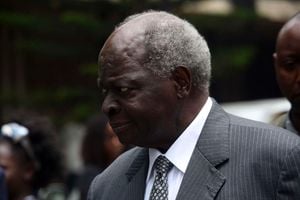When African music lovers overrun a Portuguese town

Afro-beats music fans from different countries attend the Afro Nation Festival at the Praia Da Rocha beach in Portimao, Portugal. The event was held from June 26 to 28.
Last week saw a lazy coastal city of Portimao, in Portugal, roar into life with African culture and music for a full week, as it hosted the biggest Afro-beats festival in the world, the annual Afro Nation Festival.
Located in the Algarve region of Portugal, the southernmost region towards the Atlantic Ocean, the city has a population of about 60,000 people, according to records in 2022. However, the festival organisers say that up to 40,000 people from over 170 countries, attended the three-day festival, starting from Wednesday, June 26 to Friday, June 28.
Being an African music festival, majority of the people who flew into Portimao were Africans, with most of them coming from different parts of Europe, United Kingdom and various African countries.
With such a big population of Africans in a predominantly white populated city, comes the culture, the food and the music. The festival organisers had a great line up of Afro-beats top acts like South Africa’s female sensation Tyla, who is a 2024 Grammy and BET awards winner; Nigeria’s Rema, Asake, Omah Lay, Flavour, Congo DRC’S star Fally Ipupa and Tanzania’s Diamond Platnumz; among many others.
It is on this same stage last year that Kenya’s boyband SautiSol flew the Kenyan flag high with a stunning performance, but missed out this year after they broke the group up and pursued solo careers. In an interesting twist, London-based UK rap group, NSG, physically took the Kenyan flag on stage, in solidarity with the Gen Z’s demonstrations in Nairobi against the Finance Bill.
Hip-hop sensation
To spice up the performances, the organisers brought in American female hip-hop sensation Nicki Minaj, who delivered an electrifying performance on the second day of the of the festival. Nicki Minaj is currently on a world tour and was able to fit her schedule to perform at the festival. This is the same way rapper 50 Cent was able to perform in last year’s festival, as he was in a world tour as well.
Away from the stage performances, there are several questions on how the festival works for all the ticket holders. For instance, being a three-day event, do they open their gates on Wednesday morning and close them on Friday when the festival ends?
That is not how it works. For the three days, the festival venue, located at the sandy Praia Da Rocha beach, is only open between 4pm and midnight, when the last performer gets off the stage. The only other people who can access the venue are accredited service providers, security personnel and events management staff members.
This gives ticket holders an opportunity to explore Portimao during the down time, when the festival is not going on. According to the organisers, the average days most festival goers spend in Portimao is about 10 days, with most people coming in a day or two before the festival and leaving after two days if not the following day.
Early arrival to the city is necessary because the nearest international airport, Faro International Airport, is about 70 kilometres away from Portimao. Depending on the means of transport used, be it train, taxi or buses, the journey between the airport and Portimao is a one-hour journey or there abouts.
As people wait for the festival gates to open, event planners get busy organising side parties. They include pool parties, all-white parties in exclusive venues across the city, boat parties, just to mention but a few. What unifies these parties is the fact that they all play African music.
One of the organisers of these parties, DJ Em from the United Kingdom, who attends the Afro Nation Festival every year since it started in 2019, says locals have embraced the African culture during the festival times over the years.
“There are some clubs that play Afro-beats music in Portugal, but they are not many,” says DJ Em, who runs his own bar in the city of Nottingham in England. “The interesting part is that for a week, most of the bars, pubs and clubs, if not all, are forced to play Afro-beats music to take care of the demand. You will find an Irish pub, a Brazilian steak house, or even an authentic Portuguese restaurant playing Afro-beats music, just because almost everyone walking in for a meal or a drink wants that kind of music to be played.”
Kenya’s Kiss FM disc jockey, DJ Xclusive, who has been a regular festival attendee, says that he has been doing research on how to use his skills in this festival.
“There are a lot of Kenyans and East Africans who attend the Afro Nation Festival on a regular basis,” says DJ Xclusive. “Some travel all the way from Kenya, while others are East Africans in the diaspora living in European countries. Next year I will be hosting East African parties, as well as try to be part of the DJs who will be playing at the festival.”
Golden Circle tickets
For the Golden Circle ticket holders, the most expensive festival ticket costs £751 (about Sh122,000), and the organisers gave them access to the private No Solo Agua beach, which had DJs, a bar and a restaurant. The private beach, located next to the VIP and the Golden Circle area of the festival, would start playing music from midday until the festival starts at 4pm.
After the performances at midnight, more after parties follow in a street nicknamed ‘The Strip’. This is basically a street full of bars and food joints. According to DJ Em, who is British but from a Ghanaian background, most bars and clubs at The Strip must play Afro-beats and Amapiano to attract more revellers.
“Generally, there are clubs that stick to their own kind of music away from Afro-beats,” observes DJ Em. “But that is like three clubs out of 30. What they notice is that no one gets into them, so they start playing Afro-beats music, if they want to cash in.”
In the past three festivals, the organisers never allowed daily tickets to the festival. One ticket gives you access to the festival for the three days. However, this year, for the sake of locals who wanted to watch Nicki Minaj perform, they had access to a one-day ticket, on the second day.
According to Andre Gomes, the president of the Algarve Tourism Region, the festival has had a significant economic and cultural impact on Portimao.
“There’s a significant increase of revenue running into millions of Euros recorded by hotels, tourist accommodation units, restaurants, bars, transportation and commerce,” said Mr Gomes earlier this week, in an interview with Portugal Resident news.
During the one week period, online taxi services like Uber and Bolt drivers from other regions temporarily move to Portimao to tap into the revenue generated by the festival. According to some hotel owners, due to the high accommodation demands, most local residents turn their homes into AirBnB and use the time their homes are booked to go on holiday.
With African music lovers in tens of thousands going into Portimao, other holiday goers use the same Faro International Airport to travel to different parts of the touristic Algarve region on Portugal. If one does not plan their journeys early, long queues and missed flights are common scenarios at the airport.
After the festival, the city of Portimao returns back to factory settings, having cashed in from the biggest African gathering in a week in Portuguese city.
John Muchiri is Kenyan entertainment journalist based in the UK. He is a former entertainment writer in the Sunday Nation. [email protected]





